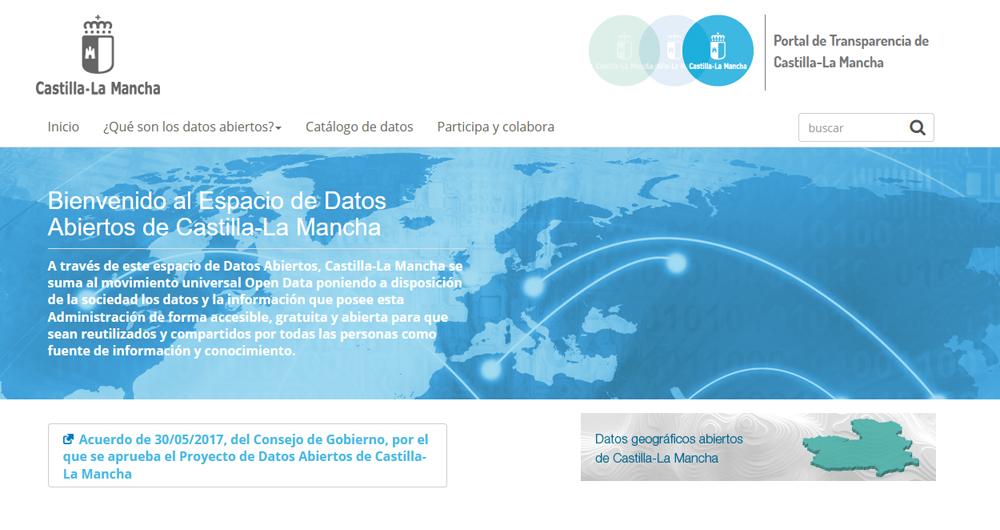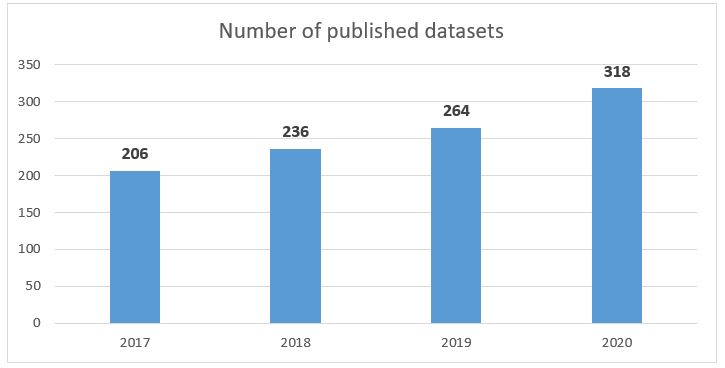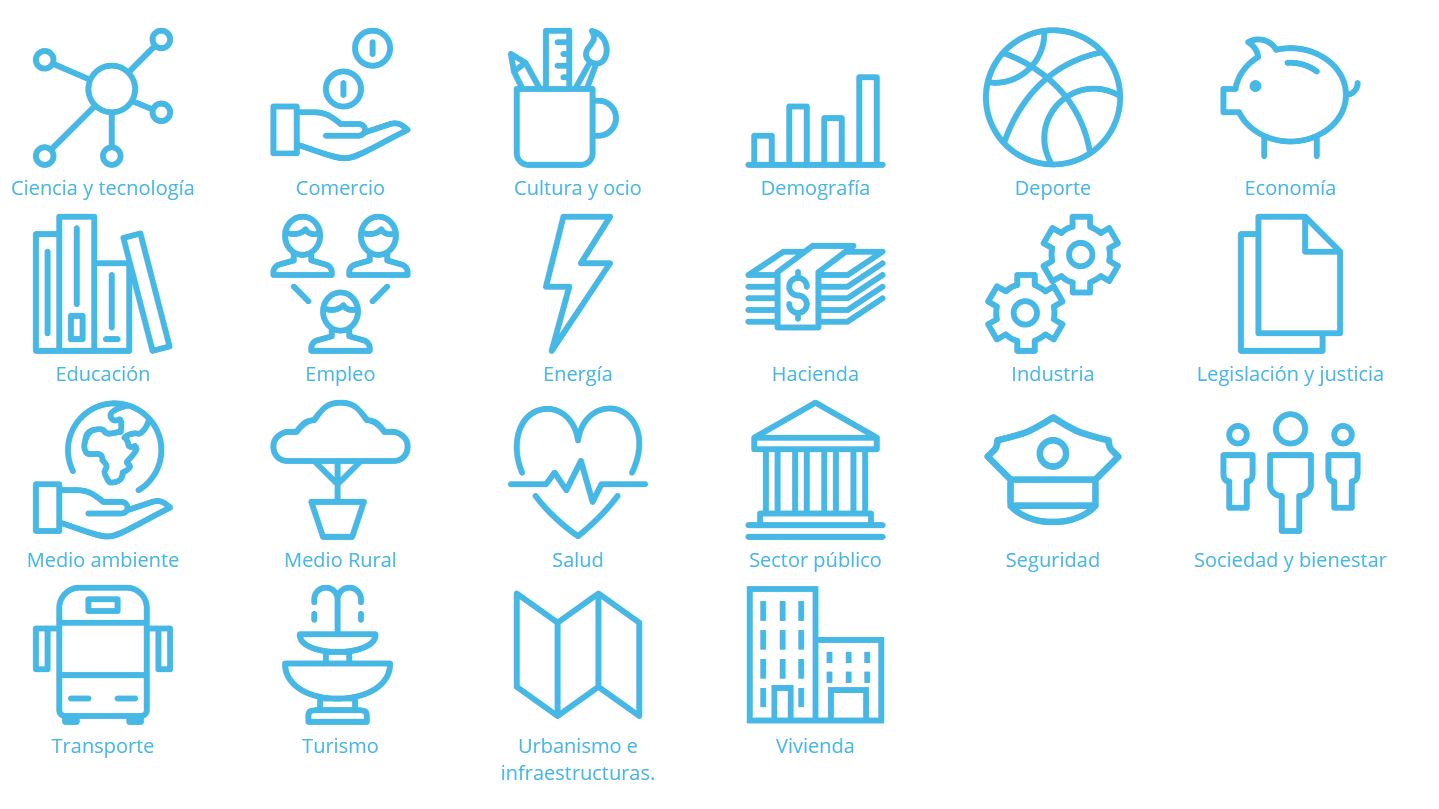
The "Open Data of Castilla-La Mancha" space began to operate on 22 June 2017, although its conception began 6 months earlier with the publication of Law 4/2016, of 15 December, on Transparency and Good Governance of Castilla-La Mancha. This law establishes in its article 27 the obligation to create, in the Transparency Portal, a space where public information data is offered to citizens in order to facilitate its reuse.
As a consequence of this regulatory mandate, on 30 May 2017, the Governing Council reached the Agreement approving the Castilla-La Mancha Open Data Project. The objective: to make public information available to citizens in accessible formats and to establish the necessary conditions for the data published to be reusable. To this end, a specific space called "Open Data of Castilla-La Mancha" was set up on the institutional Transparency Portal.
A constant effort to open up data
This space was born with 140 datasets, which have been gradually increased based on the work of identifying and selecting other datasets from various databases and which are documented according to criteria of social utility, added value and easy access. Within this space, a specific link was also created to Open Geographic Data of Castilla-La Mancha, where citizens can find geolocated data under the ESRI methodology.
Thanks to the constant collaboration with the different Regional Ministries, 206 datasets were created by the end of 2017, a number that has been increasing to reach 318 in 2020. This represents an increase of 54.4%.

On the portal, the datasets are classified into 22 categories to facilitate the search by users. Public sector, Environment, Rural environment, Health and Tourism are the categories with the highest number of datasets.

The importance of collaboration
Datos Abiertos de Castilla - La Mancha sees collaboration with other organisations as a fundamental element for the development of data reuse and openness. In this sense, two initiatives stand out:
- Inter-administrative collaboration. They are members of the Data Re-use Working Group in the Sectorial Committee for e-Government and collaborate in the initiatives that are being carried out, such as the definition of vocabularies, the opening of common datasets (associations, foundations, cooperatives), etc.
- Collaboration with ASEDIE. On a permanent and continuous basis, they collaborate with the Multisectorial Association of Information (ASEDIE) for the opening of new datasets such as, for example, the register of cooperatives, the register of Transformation Public Limited Companies or the register of hotel and catering establishments.
Next steps
Datos Abiertos de Castilla - La Mancha wants to continue advancing towards a greater promotion of openness and reuse of its data. To this end, 4 goals have been set to be achieved in the near future:
- Improving the visualisation of information. Among the objectives to be addressed in the coming months is the preparation of an improvement plan for the Castilla-La Mancha Open Data space. This plan will include the creation of a "scorecard" where statistical information will be displayed graphically and on a monthly basis. Among others, it will include indicators such as the evolution in the number of datasets, data formats, datasets by categories, the number of accesses made or the most visited and downloaded datasets. These indicators will facilitate the analysis and monitoring reports on the initiative. The plan will also include the promotion of data publishing using APIs.
- Incorporation of "high value" data based on the new Open Data Directive. Directive 2019/1024 on open data and re-use of public sector information seeks to encourage the use of open data and stimulate innovation by establishing a set of minimum standards governing re-use. Among these rules is the promotion of high-value data. Castilla-La Mancha will work on improving datasets related to the agricultural sector, energy efficiency and information on companies and enterprises, as well as demographic and economic indicators.
- Continue with the dissemination and awareness-raising through a Training Plan. Since 2018, a specific course on "Open Data and reuse of regional public sector information" has been offered for public employees of the Regional Administration and its Autonomous Bodies, as well as a Conference on Transparency and Access to Public Information, organised by the University of Castilla-La Mancha. These conferences address topics such as document management, transparency and information management, data protection and the role of open data. This year will also see the start of an expert course, in collaboration with the University of Castilla-La Mancha. Entitled "Open Government", the course will last 150 hours and will include a module on "Publication and re-use of open data". It will be aimed at public employees in subgroups A1 and A2 of the regional administration and its autonomous bodies.
- Promotion of a single policy or strategy in the management of Open Data and a Data Office. Datos Abiertos de Castilla - La Mancha considers it essential to draw up a Data Governance Strategy, understood as the corporate management of the data, information and knowledge of an organisation with the aim of harmonising, sharing data, promoting ethics in its use, guaranteeing the security of the information and its publication in a coordinated manner (promoting the availability and usability of the information). All of this in a way that allows accessibility, availability and clarity. In this sense, they consider it essential to create a "Data Office" as a key element for the unified management of public data and the exploitation of information. The first step will be the creation of a specific working commission in which all institutional actors involved in data management will participate. It will analyse the situation, make proposals for the elaboration of the strategy and lay the foundations for the creation of the Data Office.
In short, this is an initiative committed to open data, which will continue working to promote continuous improvements in the provision and access of citizens to public data in the region.